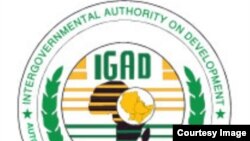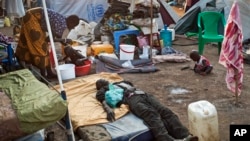NAIROBI —
The East African bloc mediating peace talks for South Sudan adjourned the negotiations on Monday to allow its envoys to try to get the talks back on track after the opposition refused to take part in the latest round.
During the adjournment, special envoys from the Intergovernmental Authority on Development (IGAD) will hold "broad consultations with South Sudanese stakeholders, the leaders of the IGAD region, the African Union the United Nations Security Council and other friends and partners of South Sudan," IGAD said in a statement.
They will also follow up on efforts that are being made to deploy teams in South Sudan to monitor a ceasefire that has struggled to take hold.
The so-called Monitoring and Verification Mechanism (MVM) was agreed to when the first cessation of hostilities agreement was signed in January, but the deployment of monitoring teams and regional troops to protect them was halted when fighting picked up again a few months later.
The two sides in the South Sudan conflict have met several times in Addis Ababa for IGAD-led peace talks. The latest round, which opened on Friday, was supposed to bring parties besides the government and opposition to the negotiating table.
The opposition boycotted the talks because, it said, a request to IGAD that groups in exile and internally displaced persons be included in the negotiations fell on deaf ears.
IGAD faulted the opposition for boycotting the talks, saying the move went against two agreements signed on May 9 and June 10 by President Salva Kiir and his former deputy turned opposition leader, Riek Machar.
Opposition Deputy Spokesman Mabior Garang de Mabior said his side is not trying to block the talks.
“I can categorically say that we are not an obstacle to the peace," he said.
"What our dissatisfaction was, was the flawed nature in which the civil society were chosen because in this case we are the ones who have championed the cause of inclusivity and we stand by that cause,” Mabior said, repeating an assertion by the opposition that the civil society groups represented at the talks were all from Juba.
Mabior said adjourning the talks will "only prolong the war and the suffering of our people, and we wanted an end to this war."
The opposition asked IGAD to allow the two main sides in the talks to continue to meet face-to-face while the mediators "work out fair representation of civil society," Mabior said.
Presidential spokesman, Ateny Wek Ateny, said the government had no hand in selecting the civil society groups who were at the talks.
He called on the opposition to return to the negotiations so that peace can be restored in South Sudan.
“South Sudanese need peace," he said. "I hope those who are negotiating peace in Addis Ababa, especially on the side of rebels, understand this and the quicker they come to attend the fourth session of negotiation, in order to expedite the signing of peace agreement so that we move to another stage, the earlier they do it, the better.”
Both sides said that the latest obstacle to the talks made a 60-day deadline for forming a transitional government, which Mr. Kiir and Machar agreed to on June 10, look unrealistic.
Several deals to end the fighting in South Sudan have been signed but none has been adhered to. As violence has ground on, the young country has fallen deeper and deeper into crisis, with the United Nations saying 1.5 million people have been forced from their homes and 3.9 million people will face "alarming food insecurity" by the end of August.
IGAD called in its statement on "the political leaders of South Sudan to assume their responsibilities with the same resolve that their neighbors and the international community attach to this tragic situation."
IGAD did not indicate for how long the talks would be adjourned.
During the adjournment, special envoys from the Intergovernmental Authority on Development (IGAD) will hold "broad consultations with South Sudanese stakeholders, the leaders of the IGAD region, the African Union the United Nations Security Council and other friends and partners of South Sudan," IGAD said in a statement.
They will also follow up on efforts that are being made to deploy teams in South Sudan to monitor a ceasefire that has struggled to take hold.
The so-called Monitoring and Verification Mechanism (MVM) was agreed to when the first cessation of hostilities agreement was signed in January, but the deployment of monitoring teams and regional troops to protect them was halted when fighting picked up again a few months later.
The two sides in the South Sudan conflict have met several times in Addis Ababa for IGAD-led peace talks. The latest round, which opened on Friday, was supposed to bring parties besides the government and opposition to the negotiating table.
The opposition boycotted the talks because, it said, a request to IGAD that groups in exile and internally displaced persons be included in the negotiations fell on deaf ears.
IGAD faulted the opposition for boycotting the talks, saying the move went against two agreements signed on May 9 and June 10 by President Salva Kiir and his former deputy turned opposition leader, Riek Machar.
Adjournment 'unnecessary,' opposition says
Opposition Deputy Spokesman Mabior Garang de Mabior said his side is not trying to block the talks.
“I can categorically say that we are not an obstacle to the peace," he said.
"What our dissatisfaction was, was the flawed nature in which the civil society were chosen because in this case we are the ones who have championed the cause of inclusivity and we stand by that cause,” Mabior said, repeating an assertion by the opposition that the civil society groups represented at the talks were all from Juba.
Mabior said adjourning the talks will "only prolong the war and the suffering of our people, and we wanted an end to this war."
The opposition asked IGAD to allow the two main sides in the talks to continue to meet face-to-face while the mediators "work out fair representation of civil society," Mabior said.
Presidential spokesman, Ateny Wek Ateny, said the government had no hand in selecting the civil society groups who were at the talks.
He called on the opposition to return to the negotiations so that peace can be restored in South Sudan.
“South Sudanese need peace," he said. "I hope those who are negotiating peace in Addis Ababa, especially on the side of rebels, understand this and the quicker they come to attend the fourth session of negotiation, in order to expedite the signing of peace agreement so that we move to another stage, the earlier they do it, the better.”
Both sides said that the latest obstacle to the talks made a 60-day deadline for forming a transitional government, which Mr. Kiir and Machar agreed to on June 10, look unrealistic.
Several deals to end the fighting in South Sudan have been signed but none has been adhered to. As violence has ground on, the young country has fallen deeper and deeper into crisis, with the United Nations saying 1.5 million people have been forced from their homes and 3.9 million people will face "alarming food insecurity" by the end of August.
IGAD called in its statement on "the political leaders of South Sudan to assume their responsibilities with the same resolve that their neighbors and the international community attach to this tragic situation."
IGAD did not indicate for how long the talks would be adjourned.







